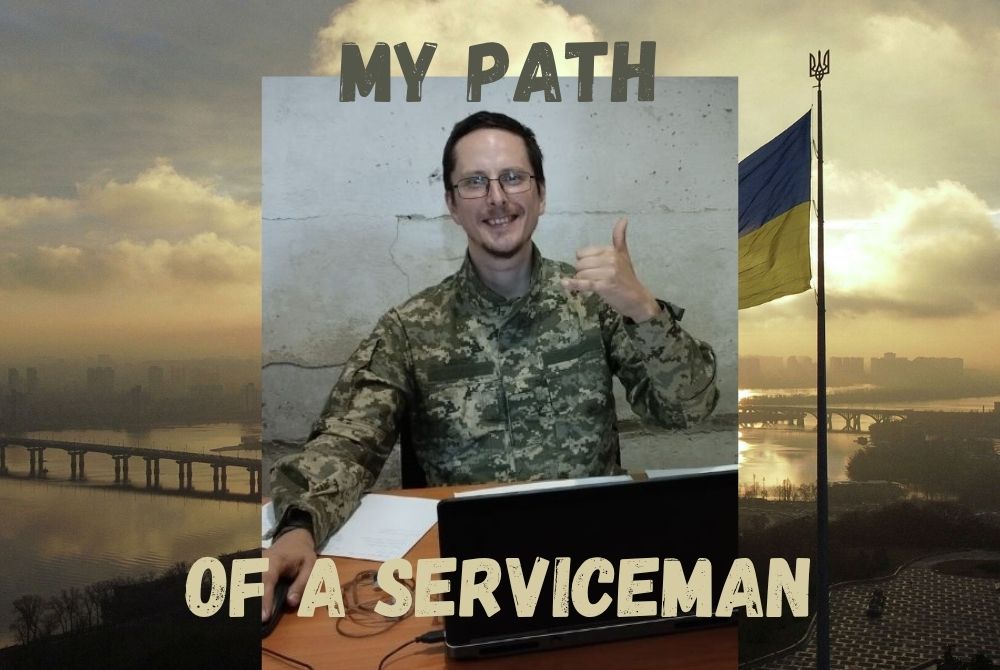Today, there was a situation that evoked many feelings in me. I will try to convey all of this now.
Throughout the day, I often recalled my boss’s words that we don’t work with paperwork, we work with people. So when I was working on a leave report, I tried to see the person requesting leave through the paperwork, as if through a magic mirror. And when I worked with a report that, on the contrary, seemed to indicate that a person had returned from vacation, I tried to see the person who had returned to the ranks and was asking for this to be noted so that their salary would be calculated again.
Sometime after 2:00 p.m., I was given another task. I had to write special notification letters. This was because our battalion had recently lost one 200th and three 300ths (missing in action). I had to write notification letters to inform the relatives of the deceased. Yes, I write “deceased” because in most cases, the 300s are the deceased whose bodies could not be found.
In order to make these notices, I had to use the personal files of these people. Studying the personal file of the deceased feels something like searching the pockets of a dead person. You look at and study information about the life of a person who has already died. And when you look at a scan of their passport, it’s as if they are looking back at you.
Marina (name changed for security reasons), a person who worked in this field, helped me make these inquiries. We corresponded via messenger.
After filling out the form for the 200th, I had to fill out three more forms for the 300s. Then my boss came in and said I had 15-30 minutes to finish because he had to leave. I don’t know why, but he wanted me to fill them out before he left. This simply confused me and almost paralyzed me. I spent 30-40 minutes filling out the report on the 200th (yes, I took a long time to do it because I was still new and was filling out these reports for the first time). And now I had to fill out three reports in 15-30 minutes.
I started quickly filling out all the necessary fields. I quickly flipped through the pages of these people’s personal files, trying to find the necessary information. I tried to just fill out all the necessary fields in these forms, and if I couldn’t find something, I just left the field blank. Marina was writing something there, but I didn’t have time to look into it.
In the end, I filled in all the fields and sent the files to my boss, and he left. At the same time, I sent them to Marina for review.
After taking a deep breath and calming down, I began to reread what Marina had written to me. Marina said there were mistakes. After checking, I saw that she was right. First, instead of the name Evgeniy, I wrote Evgen, and second, instead of 09.01.year, I wrote 01.09.year. It may seem that these are insignificant mistakes, but as it turned out later, they were important and needed to be corrected.
And now, in a calm atmosphere, I began to delve into the situation. As I said, the system was as follows: the military unit itself does not have the right to inform the relatives and loved ones of the deceased about his death. This is difficult news, and if some clerk just picks up the phone and hastily tells them, it would be inhumane. Therefore, a special document is written at the TCC, and from there a separate person goes and informs the relatives of the deceased.
But there is an important detail: since the main goal is to find the relative of the deceased, the certificate must be sent to the TCC of the city where the relative lives. Therefore, even if the deceased was registered, for example, in the Zhytomyr TCC, but the relative lives in Chernihiv, the certificate must be sent to the Chernihiv TCC.
Regarding these seemingly minor mistakes, Marina said that the relatives would then go to obtain certificates stating that their families were left without a breadwinner and their children were left without a father. And the institutions they go to will look at the very certificates that our unit sent. The certificates that I filled out with my eyes bulging from the rush. And if there are any discrepancies, then… Well, you can guess what will happen.
Yes, I began to delve deeper and deeper into this situation. It was no longer just a piece of white paper. It was people’s lives. Not in the sense that their lives depended on it. But these were things that were really important to people.
I forgot to mention that all four people I was writing references for were ex-cons. So when I reread the documents and questionnaires they had filled out, I was confronted with… how can I put it… ignorance, I guess. They left out a lot of fields that needed to be filled in. And when they wrote about their relatives, they left very little information, for example, they only wrote the name of the village where the relative lived. And that’s it, no city, no street, no house. Of course, almost no one left their relatives’ phone numbers.
In a way, I understand them. I myself recently filled out similar forms. When you are asked to write down all your close relatives and, most importantly, their contact details, you understand why. And probably most people at that moment think, “No! In my case, it won’t be necessary! Come on, why do I need this?” Of course, it is difficult for a person to accept that such a scenario is possible.
But still, the indifference of these people when filling out the forms was too strong. It got to the point where, in two notifications, instead of the exact address of the contact person, we wrote the exact address of the victim (they wrote their address in more detail), hoping that the TCC employees would be able to find something.
Impressed by the situation, I began to study the personal files of these people in more detail. I tried to read every line. In one of the cases, I saw that the mother of one of the victims had died in 2015. And I had written her down as the contact person. That is, the person who would be told about her son’s death. I wrote this to Marina, and she said, “I wrote to you before that it would probably be better to write down his daughter as the contact person.” I looked, and indeed, she had written that, but I had simply overlooked it because I was in a hurry.
The news that we would be sending the daughter a message about her father’s death made me feel heavy. I started to think – considering that the father is a convict, how does the daughter feel about him? Will she be upset by this news?
It turned out that a couple of days ago, the daughter of the deceased had written a report to our military unit saying that her father had not been in touch for a long time and she wanted to know what had happened to him. This brought me almost to tears. I was overwhelmed with emotion. This was no longer just a name on a piece of paper. This was a living person who was worried about her father. And then I remembered how I had hurriedly filled out the form, without really understanding what I was doing.
Given that the deceased had not written his daughter’s address (he had only written the name of the city and nothing else), I initially wrote only the city in the relative’s contact details field. But then, from the daughter’s report, I took the exact address and even the zip code. At least now there was something human in this case. Now I could only hope that the TCC employee would take this task seriously and do everything right.
Realizing that there will be many more situations like this, and that I will have to fill out many more documents like this, I understand that I need to learn to take it all less emotionally, not to let it get to me so much. But under no circumstances do I want to become indifferent to all this. You always have to remain human and understand that you are not working with pieces of paper, but with living people.




